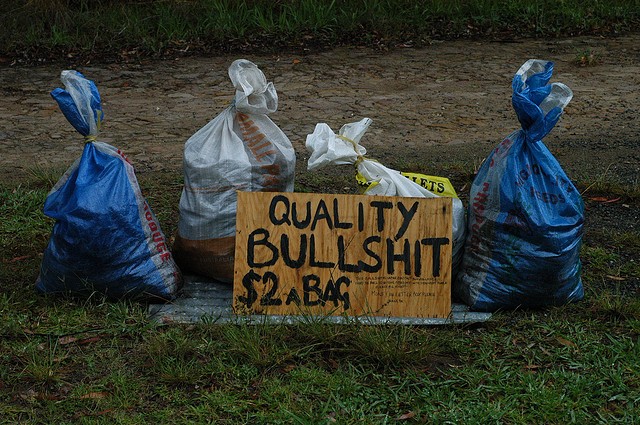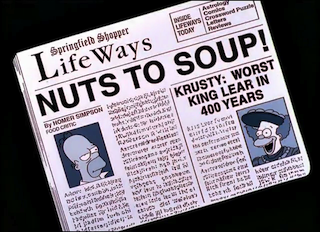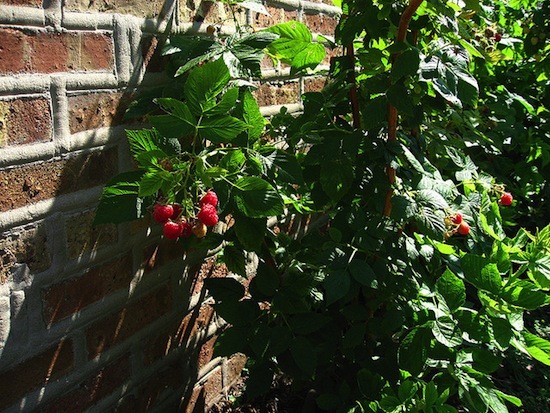
I read a lot of food writing. A lot of it–in fact, at least 80 percent of my RSS feed is food–and I'm getting tired. I'm tired of having to sit there and mentally analyze every article I write for the signs of bullshit food writing, because the signal-to-noise ratio of food writing is headed straight down the pan.
If it's not some opportunist pretending to be excited by something he got for free, it's some jumped-up Yelper who casually informs the server that she'll be reviewing their food tonight for [insert name of blog] here. That's not counting the legions of people who have absolutely no idea what they're talking about.
There are many, many honest food writers, and I read them and appreciate them; there are even more honest professional food writers, perhaps because there are more eyes on their work. Sadly, unless you read everything with a questioning eye, you're going to have a bad time; you'll end up in some hyped restaurant saying, “What the hell happened here?”
]
While we're at it, a quick statement of the rules of ethics imparted by our Mexican-in-Chief:
1. We buy the things we review; free stuff we receive at the office is distributed to non-food people first, mostly because none the food writers are on staff and therefore are never there anyway. We turn in receipts every month.
2. Reviews are always done anonymously, which is why only one or two people have ever identified Edwin Goei. (Pro tip: he looks exactly like Gustavo Arellano.)
3. Anyone who ever dared trade on the OC Weekly name to get a free meal would be laughed out of the office, penniless and humiliated.
4. If your food sucks, we're going to say so. None of us have ever met the advertising people; there's a literal as well as a figurative wall between the editorial department and the advertising department.
Now, without further ado…
1. They only review free products.

If you receive something for free and you write a positive article about it without admitting it was sent to you, you are a bullshit food writer.
It's amazing how many food writers do this. Every food writer receives free things from time to time, but it's truly amazing that these “reviews” are universally positive. What are the chances? The worst offenders are the ones whose writing is just one continuous string of PR blow jobs. When I see the rare case of someone receiving a free product and then outlining both its pros and its cons, I applaud.
2. They identify themselves ahead of time.

“Hi, my name is Eric and I'll be your waiter tonight.”
“Hi, my name is Fulano, from the celebrated blog Fulano's Bullshit Restaurant Reviews. I'll be reviewing your food tonight.”
If you tell the restaurant ahead of time–if, God forbid, you tell them when you make the reservation that you'll be dining in review of the restaurant, you are a bullshit food writer.
It doesn't matter whether you admit that you identify yourself ahead of time; within a few months, it'll be known. The food writing world is very small in many ways; “he self-identifies” is the kiss of death for a reviewer's credibility. How many people trust the word of the Yelp “Elite”, who go around having parties at restaurants who want positive Yelp reviews?

Ruth Reichl's famous “raspberry” review of Le Cirque in 1993 in The New York Times illustrates the problem with this: when the kitchen knows who you are and why you're there, they elevate your dining experience above what your average dining patron would receive–and if they're smart, they make sure the people around you are having a good time. This is why I hate media previews–they have nothing to do with the restaurant's operations after opening and everything to do with making sure the staff knows who's writing about them.
[
3. Their reviews don't concentrate on the food.

If your article isn't at least 50 percent about the food and drink, you are a bullshit food writer.
While dining as an experience is the sum of many parts, including ambiance, cost, service, and pace, I'm going to stick my neck out here and say the food is probably more important than the recreated water garden in the foyer or the chef's bona fides. It's amazing how many people forget to review the food. I've read food reviews that concentrate on the beauty of the waitstaff, on the chef's home life in France, on the stupid ex-bro investment analysts at the next table. I've even read reviews of Asian restaurants by white supremacists, which made my eyes roll so hard I nearly had a seizure.
Talk about the food. Talk about everything else, too, but talk mostly about the food.
4. Their reviews are just pictures and labels.

If you can't form an opinion about the food you've eaten, or if you write breathlessly positive reviews about everything, you are a bullshit food writer.
I can't count the number of food blogs whose posts are just strings of pictures with captions underneath describing them. Even Yelp requires actual prose in order to file a review. While photos can be useful on those rare occasion that I wonder what some bizarre creation could possibly look like, and while there are some truly outstanding food photographers out there, that's not a restaurant review; it's a pictorial menu, like the ones they give non-Asians at dim sum.
A restaurant reviewer needs to opine. If you don't get to know the reviewer's taste, there's no way you can translate the reviewer's ideas into whether you want to eat there. As an example, I know how my opinion differs from Jonathan Gold's, because he is not in the least shy about telling you what he thinks of a restaurant. When I read a Gold review, then, I can look at the points where we're likely to disagree and say, “Well, that's probably crap then.”
5. Their writing is just restated PR crap.
“Los Pollos Hermanos, now using chicken from the west side of the battery cages! 4% more sunlight and fresh air!”
If all you ever put up is rehashed press releases in an attempt to up your post count, you are a bullshit food writer.
I get dozens, if not hundreds, of press releases a week. Every PR person wants you to write about every little thing, because the more their clients' names are in the press, the more business comes to their clients. Sometimes these press releases matter, and you'll be able to spot the professional PR firms a mile away; however, just making copypasta out of the release is bullshit food writing.
It's pathetically easy to spot the people who do this, because they studiously copy every single detail from the press release, so the article doesn't read like the others. Fortunately, this is easy to fix: if you get a release claiming that Restaurant X now has craft cocktails, go and have one (and pay for it), then write about whether they actually know how to make a cocktail.
Follow Stick a Fork In It on Twitter @ocweeklyfood or on Facebook! And don't forget to download our free Best Of App here!


I recently tried CBD gummies from this website https://www.cornbreadhemp.com/products/cbda-oil in search the prime prematurely and was pleasantly surprised past the results. Initially skeptical, I start that it significantly helped with my dread and slumber issues without any remarkable side effects. The oil was effortless to use, with definite dosage instructions. It had a indulgent, earthy leaning that was not unpleasant. Within a week, I noticed a marked increase in my blanket well-being, hunch more serene and rested. I appreciate the ingenuous approximate to wellness CBD offers and procedure to go on using it.